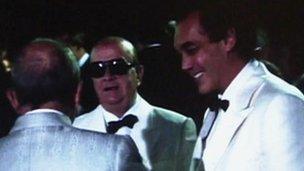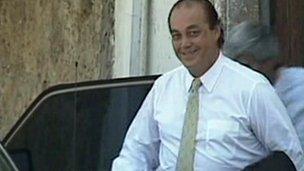Asil Nadir: City conman with 'dangerous charisma'
- Published
The BBC's Clive Coleman says Asil Nadir remained defiant for two decades
Tycoon Asil Nadir has been convicted of stealing £29mfrom his Polly Peck business more than 20 years ago. But what sort of man was he?
"He's got so much charisma, it's dangerous". So says Peter Dimond, the pilot who flew Asil Nadir out of the country in 1993, before his trial for the alleged theft of millions of pounds from Polly Peck International (PPI).
Asil Nadir has always been a man of extraordinary drive. Born in Cyprus in 1941, he started selling newspapers at the age of six. He studied economics at Istanbul University, but says that before graduating circumstances forced his return to Cyprus where he went on to set up a clothing business.
The 1980s was the get-rich-quick decade, and few got richer, quicker than Asil Nadir.

All smiles in the 1980s: Let the good times roll
In 1980 he bought a £300,000 stake in a small textile company called Polly Peck. Over a decade he devoured company after company, turning it into a global conglomerate.
The corporate expansion culminated in 1989 when the man from Del Monte said 'yes' to a Nadir bid.
By 1990 Polly Peck International (PPI) had 200 subsidiaries worldwide. Its activities were vital to the isolated northern Cyprus economy. Back in the UK, PPI was a stock market favourite and a Conservative Party donor, and Nadir was the toast of the City.
The extraordinary growth of PPI was driven in large part by the tycoon's sheer force of personality and, he told me, his punishing schedule.
"My working week was certainly six and a half days a week non-stop, and the hours were anything from 14 to 18 hours a day for many years," he said.
"You have to understand people like me. Cyprus was a British colony and from my childhood I always aspired to come to Britain, to have my life in this country.
"People in developing countries have tremendous ambitions."
Island 'hero'
Ersin Tatar worked for Polly Peck and is now the minister of finance in the northern Cyprus administration.
He said Nadir was a hero to many in the isolated Turkish-controlled territory.
"On the island one of the main problems that we suffer is high unemployment," he said. "With Nadir coming from abroad with a lot of international finance behind him, investing in new industries like citrus, hotels and other industries, it was all very positive outlook.
"He was a very powerful man, very charismatic. When you went in front of him you just couldn't challenge the guy. I mean he was that powerful. I was in no way able to question him."
But things fell spectacularly apart for Asil Nadir in September 1990 when the Serious Fraud Office (SFO) raided his management offices in Mayfair.
Asil Nadir blames the raid - not his actions - for how Polly Peck's share price began to dive, leading ultimately to the conglomerate's collapse.
"It was a very public raid with newspapers. As the raid was progressing, my lawyers were on the telephone and said we could be of help to them," he said.
"They [the investigating authorities] create a cloud over you which is very damaging.
"It can have a devastating effect."
The SFO initially investigated alleged insider trading. That was dropped and the probe began to focus on Nadir's alleged theft of more than £100m from the company.
SFO battle
But from the outset, the investigation was dogged by controversy.
The SFO case was that money had gone missing from London.
Asil Nadir said the evidence showed there had always been equal and balancing payments at the northern Cyprus end of the operation before withdrawals were made in London - and that the SFO had failed to follow the evidence.
Secondly, the SFO had inadvertently taken legally privileged papers belonging to Asil Nadir.
It emerged that the SFO case controller, Lorna Harris, had not fully briefed the then Attorney General Sir Nicholas Lyell QC on the issue, and he had inadvertently misled Parliament as a result.
Michael Mates, then a Conservative minister and friend of the businessman, attacked the SFO's handling of the case in an extraordinary speech in the Commons. He quit after it emerged he had bought Asil Nadir a watch inscribed "Don't let the buggers get you down".
Events culminated in 1993 with a bizarre and arguably unprecedented situation - an investigation into a possible plot involving Asil Nadir to bribe the trial judge, possibly involving the judge himself.
Nadir maintains the allegations of a plot were completely invented. It turned out they came from a police informant who never emerged into the light of day - and the probe was dropped.
However, in May 1993, as the trial approached, the tycoon claimed that he had lost faith in British justice - and he fled.
He said: "The injustice was so unbelievable. It was a dash to save my life having experienced all this pain here.
"What else could one do because you are seeing so much injustice?"
Peter Dimond, the pilot who helped him escape, told me how he did it - dashing from London in a car.

Peter Dimond at the Dorset airfield where he and Asil Nadir took off in 1993
"He left the house quite cleverly, by leaving his manservant at the window wearing one of his coats and generally looking like him," he said.
"He had a little plastic bag with a wig and moustache. He was a very heavy smoker and at one time had two cigarettes, one in each hand."
Mr Dimond took me to the field in Dorset where he said a plane was waiting all those years ago.
"We came right up to this gate, left the car where it was, walked straight through. The aeroplane was right in front of us, the engines were turning, the door was opened. I bundled Nadir in and within 35 seconds we were airborne."
In 1998 Mr Dimond was convicted of committing an act tending and intended to pervert the course of justice but he was later cleared on appeal.
Nadir eventually reached northern Cyprus, from where he could not be extradited because he was a citizen of the so-called Turkish Republic of Northern Cyprus (TRNC), a country recognised only by Turkey.
I went to the island to meet those who knew him during these years of self-imposed exile.
Rauf Denktash, the founder of the TRNC, spoke to me about the affair, before his death earlier this year.
He recalled the extraordinary atmosphere following PPI's collapse and the pressure he faced to hand the businessman over to the UK - a country that refused to recognise his administration.

Beyond the law: Asil Nadir in Northern Cyprus, shortly after fleeing the UK
"I was shocked. I said [to the British] under my constitution he has committed no offence here. We can't deport a subject and I can't arrest a man just because you request it, I'm really shocked."
But Nadir eventually returned to the UK in 2010, saying that he wanted to clear his name.
"I now realise that justice is more important possibly than health and education. Everybody deserves that and I felt that I deserved it.
"I was innocent in 1990, innocent today. Injustice and the pain it inflicts on a person you can never remove it unless you find some justice and I will continue to do so."
Did he steal the missing millions?
"Absolutely not," he insisted. "It makes you wonder, a man worth hundreds of millions of pounds spending dozens of millions of pounds a year on charity, what motive does he have, for God's sake, to actually steal money? You steal money from an entity that you've created yourself? Absolutely not."
Mr Denktash told me before his death that he admired Mr Nadir's "courage" in returning to face trial in the UK.
But Mr Tatar is more circumspect. He was named in the trial as one of Nadir's main helpers, organising the transfer of funds illegally out of London. He denies that allegation.
"He was a man who wanted to succeed in a very short period of time that others couldn't. But obviously his ambition, maybe powerful ego and other charismatic attributes for a man of that kind did get him into some trouble at the end of the day."
- Published26 August 2010
- Published22 August 2012
- Published22 August 2012
- Published23 January 2012
- Published28 June 2012
- Published26 June 2012